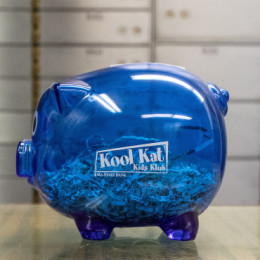Combating Online Thieves
Shopping in your hometown is good for the local economy, but there are times you may need to shop online. Protect your personal information when shopping online and reduce the chance of fraud with these online shopping tips, courtesy of the Independent Community Bankers of America:
- Make sure your computer and browser are secure and up-to-date with the latest updates.
- Choose unique, secure passwords.
- Be cautious when giving out personal information.
- Look for secure sites.
- Never respond to an offer by way of a spam or bulk email.
- Always use the company’s website to access deals and discounts.
- Keep record of all purchases.
- Avoid providing unnecessary information.
- Due to domestic, state, and federal consumer protection laws, shop with US based companies.
Don’t let a good deal fool you. Remember: “If it sounds too good to be true, it usually is.”
Online fraud is any kind of scheme that uses the Internet – chat rooms, emails, or websites -- to gather personal information about individuals and use it fraudulently. It includes Phishing and Spoofing.
- What is Phishing? Phishing occurs when you receive a fraudulent email message with a link that appears to be from a trusted source, such as a bank, government agency, or merchandise company. Clicking on the emailed link may lead you to a fraudulent website that looks similar to the site being imitated and most likely will request a release of personal information.When in doubt, don’t follow the emailed link. Instead, go directly to the website you know and trust.
- What is Spoofing? Spoofing occurs when a “shadow copy” is made of a legitimate website where the attacker is able to gather your personal information (including passwords and account numbers) from the fake site.
Here are some tips to protect yourself from Online Fraud:
- Don’t Judge by Initial Appearances. Criminals are skilled at creating professional looking sites. Don’t trust it if it seems suspicious. If you notice your inbox contains emails with warnings such as “Your Account will be Shut Down unless you reconfirm Necessary Information”, do not be fooled! Delete the email and check the company’s website instead.
- Be Careful About Giving Out Personal Data Online. Iowa State Bank will never send you any alerts requesting the disclosure of your personal information.
- Be Especially Wary of Emails Concealing their True Identity. If you do not know who a message is from, if it has a suspicious sender such as W8L9K2@provider.com or if a message looks skeptical, do not open it.
- Review Credit Card and Account Statements. Review all account statements and confirm with your records.
- Watch Out for “Advance-Fee” Demands. Online crooks may ask you to send a check or money order right away to a post office prior to receiving your order.
- Use Secure Sites. Always look for the “lock” icon on the browser status bar, or the “https” in the address bar. If you have doubts about if you are at the correct website, contact the company by phone.
- See these resources:
| Organization | Website |
|---|---|
|
Federal Trade Commission (FTC) Consumer Response Center |
|
|
Internet CrimeComplaint Center (IFCC) |
|
|
Consumer Fraud (DOJ/Homepage) |
|
|
FirstGov (Your First Click to the U.S. Government) |
|
|
Consumer.gov |
|
|
Social Security Administration |
|
|
Identity Theft Resource Center |
Dos and Don’ts of Secure Passwords:
- Don’t use personal information that can be easily accessed or guessed
- Do use a combination of uppercase and lowercase letters, numbers, and symbols
- Do develop a mnemonic (pattern of ideas, letters, or associations) to remember complex passwords
- Don’t use words found in any dictionary of any language
- Do change your password periodically
- Do use different passwords for different accounts and systems
- Don’t store passwords or security question answers on your device
August 2, 2022 by Iowa State Bank









